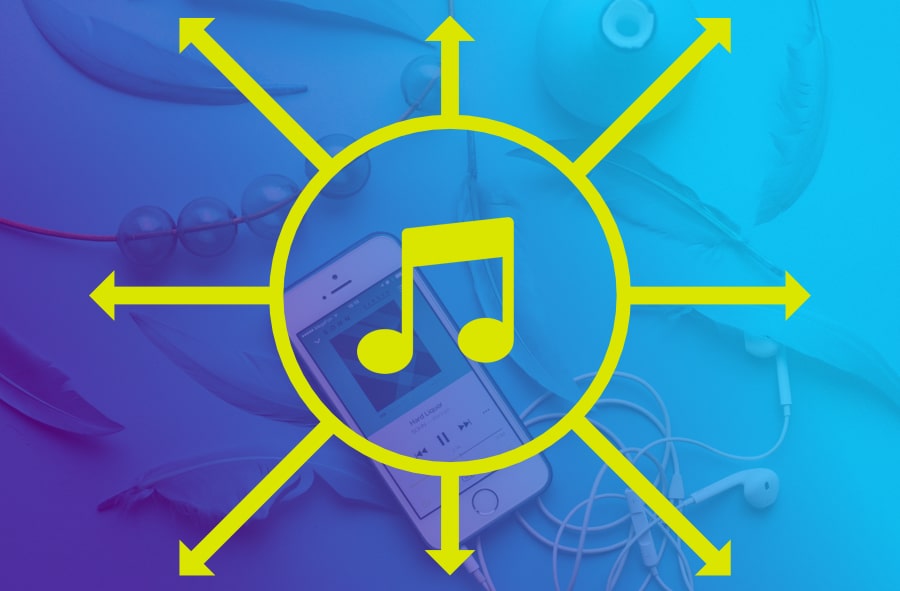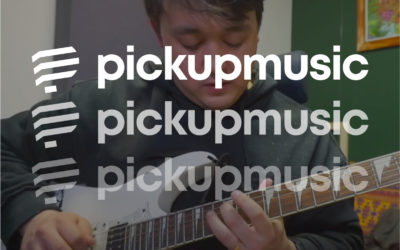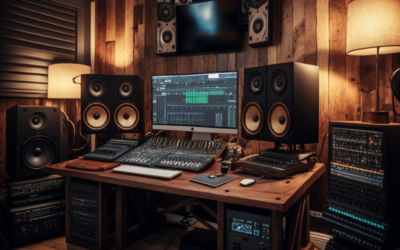Getting your music on Spotify, Apple Music, and all of the other download and streaming platforms really makes you have the feeling that you really accomplished something and that you are on the right track with your music career, especially if it’s the first time you have had your music distributed to these platforms.
Let’s learn how distribution has changed over the years and how you can benefit from learning about how music distribution works today.
Music distribution links your finished musical creation with your fans. Getting the right distribution plays a big part in promoting your music. The only way artists can release their music and get their records released world-wide is to sign up with digital distributors.
Digital streaming and downloads have taken over the sales physical records. Digital sales have become more than physical sales reaching a peak in 2015.
As a musician, digital distribution is a must in order for your music to build an audience. Getting digital distribution gives you more opportunities. It lets your music reach as many listeners as possible. You also get royalties for the sales and streams you get.
Let’s jump into everything you need to know about digital music distribution and what you need to do to set yourself up for success.
How To Distribute Music: The Past and Present
In the past, the distributors would put albums in brick-and-mortar stores that they had a deal with. The record labels would go to the distributor to get the album placed in viable locations and stores. And in each step of the process, each of the intermediaries took a bite of the revenue.
The system is still around today. However, it is limited to a certain extent. However, the role of the record labels had begun to change. Not to mention the online changes that have created a music revolution and completely changed the way that people consume music. People started to download music online and now stream music. Thus leaving to people spending less money on physical labels.
Moreover, music companies spend a lot of resources and energy on best-seller records only. Smaller music groups that sign up with them, get trapped in smaller contracts that block out their success in the end.
Therefore, distributing music digitally has become the best way to get the music labels out there, while retaining the copyright to your music.
What Exactly Does Distributing Music Mean?
Music distribution is how music will be delivered to the listener. Before the digital age, distributors would enter into contracts with different record labels to sell to the stores. However, distributing music digitally cut away the middleman – letting artists distribute music directly to online shops while retaining all their royalties. One of the first companies to do this was CDBaby under the direction of Derek Sivers.
How Distributing Digital Music Works Now
Basically, the goal of digital music distribution is to get your music on the various streaming platforms and digital music stores such as iTunes, Spotify, and Tidal – just to name a few. Once your music has been distributed to the music marketplace and streaming services, people can stream, download, and buy your music. For each of these transactions, you get royalties.
Guess who is cut out of this deal? That’s right the record labels (if you are independent).
It basically works the same way it did in the past, but instead of shipping boxes of CDs or vinyl across the country or world to thousands of small stores, digital distributors send a file to the digital music stores and streaming services. What used to take months and cost a lot due to manufacturing and shipping is reduced to a fraction of the cost and time spent.
The Best Music Distribution Companies
There is a red ocean full of music distribution service companies out there. Each one of them have their own payment system and it gets confusing very quickly. You want to make sure you keep as much of your royalties as possible or they only take a minimal cut. I would seriously recommend taking your time and educating yourself on all the fees that might be included as well as hidden and additional costs that they might not directly mention. You need to do your research before committing to a digital distributor, and one of the best articles I have found comparing the various distribution companies is from the AriesTake post, Who is the best distribution company for music?
Here we have some examples of some of the more popular music distribution companies.
- TuneCore
- CD Baby
- Ditto Music
- Distrokid
The Advantages of Digital Music Distribution
Digital streaming has taken over the music industry and changed it forever. For the first time since 1999, the music industry has seen a rise in revenue. The major of this is due to digital downloads and streaming. Here is the breakdown of revenue of the music industry.
- 47% from Streaming
- 25% from Physical Sales
- 14% from performance rights
- 12% from other digital methods (download, etc)
- 2% from sync revenues
Going the digital-only route for your first album can save you a lot of money.
Record Labels are no longer the gatekeepers to distribution. So that means you don’t have to give up any rights to your own music if you want to release your music to the world. In the past without a record deal, you were stuck selling CDs out of your van or persuading independent record stores to stock your CD
There are also special things to bear in mind like a recommended song list. Therefore, you can recommend the songs to what people like and what they want to listen to. This is how people can find new music in the digital industry.
Ready to find a digital distribution company for your music? Here are several steps you should take:
1. Choose a Digital Music Distribution Company
Your album is ready – the mixing, the mastering, and the album art. You are ready to get it out into the world.
Now you might be trying to figure out how to get a proper music in all different music stores. The first step is to get on a proper online music platform.
Here are just a few of the more popular digital distribution services:
TuneCore
TuneCore has been around for a long time, almost as long as CDbaby. They originally were in the spotlight because they were one of the first to not take a commission from the artist royalties. However, they have a subscription model that can start to get very pricey with many releases.
View their pricing right here.
CDBaby
CDBaby has been in the online distribution games the longest. They offer a lot of value through their blog and podcasts, which has millions of listeners. I believe they provide a great service and are very open and transparent. They offer a one-time fee for distribution, but take a 10% commission.
Check out packages costs here.
Distrokid
Distrokid has gained a lot of popularity these past few years with the shear simplicity of using it. They have a subscription service that allows you to distribution an unlimited amount of music for a single price of $19.99. This would be great for anyone looking to release a lot of music regularly. There are a lot of extras that you need to price for though that some other distribution services offer for free.
Check out Distrokid here. (You do need to register first to check out their plans)
Picking Out The Right One That Suits You
Each of the platforms has their own price plans. Read each of the distributor’s package plans and special terms.
Always know that a company is a partnership, so pick one that benefits you the most. The distributor has to fit your needs, and your objectives in the long run.
Some of the biggest factors:
- If you want to pay a one-time fee or a yearly subscription
- Commission percentage (If they don’t take any, that would be great)
- Include other revenue streams such as Youtube, etc..
2. Make Sure The Music Can Be Searched Online
If you want your music to be easily found by potential listeners you need to let it be easily searchable by adding information to the recordings when you upload them.
This information is called metadata. The information and keywords make it easy to sort and categorize into the streaming and download services’ databases.
With digital distribution of music, you must have proper metadata. All digital companies will ask for this data. This is how people can find your music on the internet – especially with the genre. Fans being able to find your music is crucial.
Therefore, when you submit your music for digital distribution, make sure to have a list of metadata:
- Artist Name
- Title of Album
- When the album is released
- Titles of Soundtracks
- Genre of Music
- Composer data
- Short Bio
3. Promoting Yourself
The distribution company is not your promotion company.
You need to be realistic about the promotion. Record Labels tend to focus on promoting their top artists and if you are an Independent artist you will have to do it yourself or start building a team.
Therefore, you need to do your own bootstrapped campaign to promote your music. So create a marketing strategy and be honest with your potential audience. Here are some ideas:
- Create a buzz about your music before it is released.
- Post a few previews of these sessions on social media.
- Play a show in the studio and stream it live.
- Upload snippets of the music to SoundCloud.
To make sure your music can reach as many people as possible, use shows, blogs, word of mouth, or any other way you can figure out get your name out of the noise. Send the emails and cold call those play-listers. There is no simple way around it.
Digital Revolution
Traditional distributors are going out of business. So does this mean you will get better opportunities?
Distributing music digitally can help give artists a level playing field. So whether an artist is backed by a label with a massive promotion budget or an independent musician grinding away, their music is out there playing on the same level.
Getting your music on to all of the major streaming services and stores is essential to being seen and taken seriously. Don’t rely on solely the free music platforms.
Now, take this information and find the best digital distribution company for you!





0 Comments